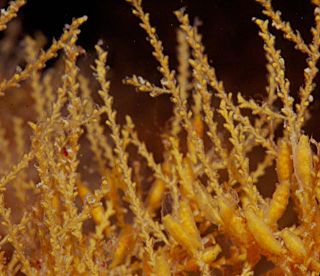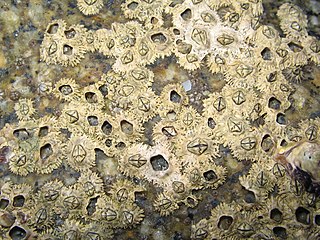| Sarsia | |
|---|---|
 | |
| Scientific classification | |
| Kingdom: | Animalia |
| Phylum: | Cnidaria |
| Class: | Hydrozoa |
| Order: | Anthoathecata |
| Family: | Corynidae |
| Genus: | Sarsia Lesson, 1843 |
| Sarsia | |
|---|---|
 | |
| Scientific classification | |
| Kingdom: | Animalia |
| Phylum: | Cnidaria |
| Class: | Hydrozoa |
| Order: | Anthoathecata |
| Family: | Corynidae |
| Genus: | Sarsia Lesson, 1843 |

The chondrophores or porpitids are a small and very unusual group of hydrozoans classified as the family Porpitidae. Though it derives from an outdated name for this lineage, some still find the term "chondrophore" useful as a synonym to "porpitid" in discussions of the two genera contained therein.

Prof Georg Ossian Sars HFRSE was a Norwegian marine and freshwater biologist.

The Linnean Medal of the Linnean Society of London was established in 1888, and is awarded annually to alternately a botanist or a zoologist or to one of each in the same year. The medal was of gold until 1976, and is for the preceding years often referred to as "the Gold Medal of the Linnean Society", not to be confused with the official Linnean Gold Medal which is seldom awarded.
The following are notable events in the Timeline of immunology:

Zyzzyzus is a genus of marine tubulariid hydrozoans, which grow embedded in sponges.
Pickfordiateuthis is a genus of tiny squid in the family Loliginidae. While four species have been assigned to the genus, only three have been named. No member is known to reach a maximum mantle length of more than 22 mm.
Bougainvilliidae is a family of marine hydroids in the class Hydrozoa. Members of the family are found worldwide. There are sixteen accepted genera and about ninety-three species.

Pandeidae is a family of hydroids in the class Hydrozoa. Like other jellyfish there is usually a mature medusa form which is pelagic and reproduces sexually and a hydroid or polyp form which is often benthic and reproduces asexually by budding.

Bougainvillia is a genus of hydroids in the family Bougainvilliidae in the class Hydrazoa. Members of the genus are characterised by having the marginal tentacles of their medusae arranged in four bundles. Some species are solitary and others are colonial but all are filter feeders. They are found in the Southern Ocean, having a circumpolar distribution, but some species also occur in the Northern Hemisphere, possibly travelling there as polyps on the hulls of ships.

Corynidae is a family of hydrozoans in the order Anthomedusae.

Coryne eximia is a species of athecate hydroid belonging to the family Corynidae.

Candelabridae is a small family of cnidarians within the class Hydrozoa. Myriothelidae Hincks, 1868 and Symplectaneidae Fraser, 1941 are now accepted as synonyms of this family.

Sertularella is a genus of hydroids in the family Sertulariidae.

Porpita prunella is a marine species of hydrozoan organisms within the family Porpitidae. It consists of colonies of zooids. Very little is known about this species, as there have been no confirmed sightings since its discovery in 1801 and naming by Haeckel in 1888. Being in the chondrophore group, it is likely that its behaviour is similar to the other species of the genera in the family. However there are also serious doubts as to its very existence as a separate species and may in fact be a synonym for Porpita porpita instead.

Capitata is a suborder of Hydrozoa, a class of marine invertebrates belonging to the phylum Cnidaria.

The Hexanauplia constitute a class of crustaceans, comprising two groups: the Copepoda and the Tantulocarida. The former subclass Thecostraca was elevated to class rank and removed from Hexanauplia in 2021.
Stauridiosarsia is a genus of hydrozoans in the family Corynidae.
Campanulinidae is a family of cnidarians belonging to the order Leptomedusae.
Amphinema is a genus of cnidarians belonging to the family Pandeidae.